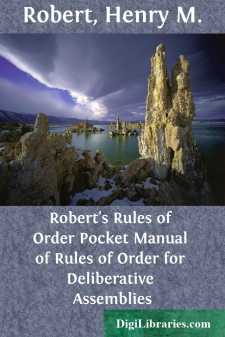Categories
- Antiques & Collectibles 13
- Architecture 36
- Art 48
- Bibles 22
- Biography & Autobiography 813
- Body, Mind & Spirit 142
- Business & Economics 28
- Children's Books 16
- Children's Fiction 13
- Computers 4
- Cooking 94
- Crafts & Hobbies 4
- Drama 346
- Education 46
- Family & Relationships 57
- Fiction 11829
- Games 19
- Gardening 17
- Health & Fitness 34
- History 1377
- House & Home 1
- Humor 147
- Juvenile Fiction 1873
- Juvenile Nonfiction 202
- Language Arts & Disciplines 88
- Law 16
- Literary Collections 686
- Literary Criticism 179
- Mathematics 13
- Medical 41
- Music 40
- Nature 179
- Non-Classifiable 1768
- Performing Arts 7
- Periodicals 1453
- Philosophy 64
- Photography 2
- Poetry 896
- Political Science 203
- Psychology 42
- Reference 154
- Religion 513
- Science 126
- Self-Help 84
- Social Science 81
- Sports & Recreation 34
- Study Aids 3
- Technology & Engineering 59
- Transportation 23
- Travel 463
- True Crime 29
Robert's Rules of Order Pocket Manual of Rules of Order for Deliberative Assemblies
by: Henry M. Robert
Description:
Excerpt
INTRODUCTION.
Parliamentary Law.
Parliamentary Law refers originally to the customs and rules of conducting business in the English Parliament; and thence to the customs and rules of our own legislative assemblies. In England these customs and usages of Parliament form a part of the unwritten law of the land, and in our own legislative bodies they are of authority in all cases where they do not conflict with existing rules or precedents.
But as a people we have not the respect which the English have for customs and precedents, and are always ready for innovations which we think are improvements, and hence changes have been and are being constantly made in the written rules which our legislative bodies have found best to adopt. As each house adopts its own rules, it results that the two houses of the same legislature do not always agree in their practice; even in Congress the order of precedence of motions is not the same in both houses, and the Previous Question is admitted in the House of Representatives, but not in the Senate. As a consequence of this, the exact method of conducting business in any particular
=== Page 10 ============================================================
legislative body is to be obtained only from the Legislative Manual of that body.
The vast number of societies, political, literary, scientific, benevolent and religious, formed all over the land, though not legislative, are still deliberative in their character, and must have some system of conducting business, and some rules to govern their proceedings, and are necessarily subject to the common parliamentary law where it does not conflict with their own special rules. But as their knowledge of parliamentary law has been obtained from the usages in this country, rather than from the customs of Parliament, it has resulted that these societies have followed the customs of our own legislative bodies, and our people have thus been educated under a system of parliamentary law which is peculiar to this country, and yet so well established as to supersede the English parliamentary law as the common law of ordinary deliberative assemblies.
The practice of the National House of Representatives should have the same force in this country as the usages of the House of Commons have in England, in determining the general principles of the common parliamentary law of the land; but it does not follow that in every matter of detail the rules of Congress can be appealed to as the common law governing every deliberative assembly. In these matters of detail, the rules of each House of Congress are adapted to their own peculiar wants, and are of no force whatever in other assemblies.
=== Page 11 ============================================================
But upon all great parliamentary questions, such as what motions can be made, what is their order of precedence, which can be debated, what is their effect, etc., the common law of the land is settled by the practice of the U. S. House of Representatives, and not by that of the English Parliament, the U....


